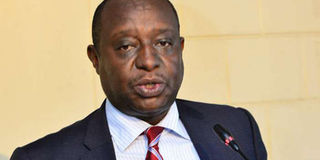More scrutiny of external debt register needed to check fraud

National Treasury Cabinet Secretary Henry Rotich addresses a press briefing at Intercontinental Hotel, Nairobi, on November 9, 2017. The law requiring that disclosures on external loans be made every four months is honoured more in breach than in practice. PHOTO | SALATON NJAU | NATON MEDIA GROUP
What you need to know:
- The big question we are not asking about the rapid rise in commercial borrowing is the issue of transparency.
- Methinks that the biggest contributor to the increase debt is the rising number of what is known as contractor-negotiated loans.
The debate about the mountains of external commercial debts, which we have accumulated in our books continues to rage.
How did we end up where we are today? You have to go back to 2014, when the National Treasury sought Parliament’s approval to increase the ceiling on the stock of external debt from $14 billion to $28 billion.
As we all know, the Public Finance and Management (PFM) Act gives Parliament authority to set limits or ceilings on external borrowing by the national government.
By raising the ceiling, we opened the floodgates and set the stage for an unprecedented spike in commercial loans in the government’s books.
TAXES
A recent report by The Parliamentary Budget Office makes some valid points on the subject matter.
First, the heavy external commercial borrowing in the past five years has not been conducted in line with the medium-term debt management strategy papers approved by Parliament.
Second, that we are in a position where a third of what we collect in taxes is now consumed in debt service.
The big question we are not asking about the rapid rise in commercial borrowing is the issue of transparency.
CONTRACTORS
How many of these loans are being disclosed and how transparent is our external debt register?
Methinks that the biggest contributor to the increase debt is the rising number of what is known as contractor-negotiated loans.
What is a contractor-negotiated loan? This is where a well-connected foreign contractor colludes with a minister to surreptitiously sign a commercial contract with a state department.
It comes with a promise by the well-connected contractor to organise funding from their country and to implement a large infrastructure project on the government’s behalf.
These contractors are able to force the government to commit to a project it did not have on its budget.
Such is their influence that they have power to push the country into contracting expensive loans from their countries’ commercial banks.
CHINA
The game is all too familiar. Once a cabinet secretary or principal secretary has signed the commercial contract, the National Treasury is invited to sign a loan contract with the foreign bank from the contractor’s country.
In this way, a new expensive commercial borrowing will have been introduced into our national external debt register.
Clearly, these contractor-negotiated loans have been a major contributor to the rise in commercial borrowings.
The Chinese are, especially, very active in this space. So are the Europeans, even the Israelis.
LOANS
The problem is that these deals are very difficult to track.
Under the PFM Act, the cabinet secretary to the Treasury is supposed to provide to Parliament a report every four months on all new loans obtained from outside Kenya or denominated in foreign currency.
It does not happen. On September 2015, a table covering a period of eight months from November 1, 2014 to June 2014 of all loans contracted and repayment terms and periods was tabled in Parliament.
The law requiring that disclosures on external loans be made every four months is honoured more in breach than in practice.
ANGLO LEASING
Parliament must insist on regular disclosure.
If this does not happen, it will not take long before we start hearing about another Anglo Leasing-type transaction.
When servicing external debts, you do not need prior approval of Parliament.
This is the loophole the scammers of Anglo Leasing exploited. The shroud around mounting borrowing must be lifted.
I still remember how, under pressure from the International Monetary Fund, in 2000, the government appointed French Investment Bank Lazard Brothers to look at the external debt account to determine the authenticity of some of the debts.
DECEPTION
The main brief for Lazard was to convene a London Club meeting of all holders of Kenya’s commercial debt and to get them to agree on a rescheduling plan.
Kenya had just emerged from a Paris Club debt rescheduling and was, therefore, compelled by the so-called rule of comparability of treatment to convince its commercial creditors to reschedule their loans.
As it turned out, the Office of the President flatly refused to release contract documents to the auditors, citing secrecy and national security interests.
As we all know today, it was just a game of deception.
Tanzania has also had its own experience with questionable loans.
In 2007, then Finance Minister Zakia Meghji had to order a full audit of the commercial external debt register after investigations revealed that irregular payments had been made from the account to service fake loans.
We should demand more transparency of the external debt register.





